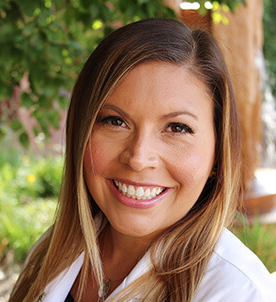
Trial Spotlight: Helena Yu on the EA5182 Trial for Metastatic, EGFR-Mutant Non-Small Cell Lung Cancer
December 22, 2021
Now Enrolling: EAQ201 to Assess COVID-19 Related Financial Hardship and Distress in Women Who Decline TMIST Participation
December 22, 2021ECOG-ACRIN Establishes Genomics Subcommittee

 The ECOG-ACRIN Cancer Research Group (ECOG-ACRIN) has created a Genomics Subcommittee under the Developmental Therapeutics Committee, part of the Biomarker Sciences Program. Its inaugural chair is Kristen Spencer, DO, MPH (pictured). Dr. Spencer is a medical oncologist in the Liver Cancer and Bile Duct Cancer Program and Phase I/Investigational Therapeutics Program at Rutgers Cancer Institute of New Jersey and an assistant professor of medicine at Rutgers Robert Wood Johnson Medical School. Below, she discusses the new committee’s origin, purpose, and goals.
The ECOG-ACRIN Cancer Research Group (ECOG-ACRIN) has created a Genomics Subcommittee under the Developmental Therapeutics Committee, part of the Biomarker Sciences Program. Its inaugural chair is Kristen Spencer, DO, MPH (pictured). Dr. Spencer is a medical oncologist in the Liver Cancer and Bile Duct Cancer Program and Phase I/Investigational Therapeutics Program at Rutgers Cancer Institute of New Jersey and an assistant professor of medicine at Rutgers Robert Wood Johnson Medical School. Below, she discusses the new committee’s origin, purpose, and goals.
What was the catalyst for the development of this subcommittee?
The Genomics Subcommittee initially began as a pilot initiative under the Gastrointestinal Cancer Committee. Its purpose was to develop possible arms for NCI-ComboMATCH, a successor to the NCI-MATCH (or study EAY131) precision medicine trial. ComboMATCH will test combinations of targeted drugs supported by preclinical in vivo evidence.
Our subcommittee was successful and had several protocol concepts favorably reviewed by ComboMATCH’s Agents and Genes Working Group. They are now moving forward and will become full protocols under ComboMATCH. Based on this success, ECOG-ACRIN leadership asked the other committees and working groups to collaborate with us on further ideas for ComboMATCH—but then, ComboMATCH temporarily paused its concept review (it is once again accepting concept sheets). We did not want to lose momentum, so leadership decided to formalize our subcommittee and move it under the Developmental Therapeutics Committee.
What is the subcommittee’s purpose?
Our purpose now is to continue to develop molecularly-informed concepts, particularly combination concepts, to move forward not just through ComboMATCH, but also through ECOG-ACRIN and PrECOG. Combination concepts can include immunotherapy, targeted therapies, chemotherapy, and radiation therapy. We hope to do this by actively engaging our industry partners and helping them develop these types of concepts with novel compounds—particularly in areas like rare tumor subtypes.
Who currently serves on the subcommittee and who can participate?
We have about twenty members right now from different ECOG-ACRIN sites, and we are always looking for new members. For junior investigators in particular, this subcommittee is a great way to get involved, especially for those who may not be well connected with industry or may be looking for a great idea for a concept.
We are collaborating with pharmaceutical companies—they attend our meetings and give pipeline presentations, and then we share what we can offer. Pharma companies provide insights about specific agents and combinations, and disease types they are looking to explore. Our investigators advise on study design and concept selection. Because we can conduct these trials through ComboMATCH, PrECOG, or ECOG-ACRIN, we can do both phase I and II studies. We have had success working this way, engaging with industry at the outset rather than later in the process.
What are the subcommittee’s accomplishments so far?
The subcommittee is still relatively new—but we do have four concepts that have been approved and are in various stages of development to be executed through ComboMATCH. We have another two concepts that will be considered in the next wave of ComboMATCH concepts. In just the few short months we have been together, we have gotten potentially six protocols off the ground.
What do you hope to achieve with this subcommittee?
I hope this subcommittee becomes a well-established and favored partner for industry to tap into when they are looking to develop concepts and they need to do so externally. I want us to be a go-to place for early phase studies and interesting combinations, particularly in rare subtypes. I would love to have more engagement throughout ECOG-ACRIN, especially from early phase investigators and new investigators who want to be more involved.
On another note, we are receiving interest from some of the molecular platforms to fund or collaborate on translational studies. I would like to continue those conversations and for us to become innovators of the correlative research that is taking place in the targeted, molecularly-driven space.
How can people from ECOG-ACRIN member sites join the subcommittee?
They can email me. We have participation from all levels—junior, mid- and senior level investigators—and a lot of mentorship is taking place. Investigators can solicit feedback from senior researchers without needing to wait for a larger steering committee meeting or task force meeting. We meet twice a month, every other Friday. I hope anyone who is interested will contact me.
![ECOG-ACRIN logo[19516]275×75](https://blog-ecog-acrin.org/wp-content/uploads/2021/03/ECOG-ACRIN-logo19516275x75.png)
